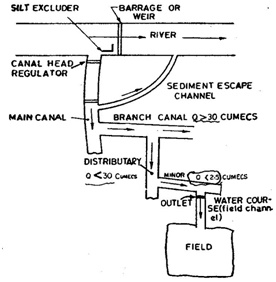Chapter: Civil : Water Resources and Irrigation Engineering : Irrigation Engineering
Relation between duty of Water and delta for crops
Delta for certain crops
The average values of deltas for certain crops are shown in table. These values represent the total water requirement of the crops. The actual requirement of irrigation water may be less, depending upon the useful rainfall. Moreover, these values represent the values on field, i.e.
‘delta on field’ which includeslosses. the evaporation
Table: Average Approximate Values of �' for Certain Important Crops in India
S.No Crop Delta on field
1 Sugarcane 120 cm (4
2 Rice 120 cm (4
3 Tobacco 75 cm (3
4 Garden fruits 60 cm (2
5 Cotton 50 cm (2
6 Vegetables 45 cm (18?)
7 Wheat 40 cm (1
8 Barley 30 cm (1
9 Maize 25 cm (1
10 Fodder 22.5 cm
11 Peas 15 cm (6
Duty of Water:
The ‘duty’ of water is the relationship betw it matures. This volume of water is generally expressed by: a unit discharge flowing for a time
equal to the base period of the crop, called Base of a duty.
If water flowing at a rate of one cubic meter per second, runs continuously for B days, and matures 200 hectares, then the duty of water for that particular crop will be defined as 200 hectares per cumec to the base of B days. Hence, duty is defined as the area irrigated per cumec of discharge running for base period B. The duty is generally represented by the letter D.
Relation between duty and delta:
Let there be a crop of base period B days. Let one cumec of water be applied to this crop on the field for B days.
Now, the volume of water applied to this crop during B days.
Volume of water applied to crop = V = (1 x60 x60 x24 xB) m3. = 86400 B (cubic metre)
By definition of duty (D), one cubic metre supplied for B days matures D hectares of land.
This quantity of water (V) matures D hectares of land or 104 D sq.m of area.
Total depth of water applied on this land
= Volume/ Area = 86,400 B/ 104 D . 8.64B/D metres
By definition, this total depth of water is called delta (�').
�'=8.64B/D (metres)
Where
�'is in cm, B is in days; and
D is duty in hectares/cumec.
During the passage of water from these irrigation channels, water is lost due to evaporation and percolation. These losses are called Transit losses or Transmission or Conveyance losses in channels.

Figure: Layout of a canal system
Duty of water for a crop is the number of hectares of land which the water can irrigate. Therefore, if the water requirement of the crop is more, less number of hectares of land it will irrigate. Hence, if water consumed is more, duty will be less. It, therefore, becomes clear that the
duty of water at the head of the watercourse will be less than the because when water flows from the head of the watercourse and reaches the field, some water is
lost as transit losses. Applying the same reasoning, it can be established that duty of water at the head of a minor will be less than that at the head of the watercourse; duty at the head of a distributary will be less than that at the head of a minor, duty at the head of a branch canal will be less than that at the head of a minor, duty at the head of a main canal will be less that the duty at the head of a branch canal. Duty of water, therefore, varies from one place to another, and increases as we move downstream from the head of the main canal towards the head of the branches or watercourses. The duty at the head of watercourse (i.e. at the outlet point is generally the end point of Irrigation Department. The control of Irrigation Department finishes at the outlet point, and the water is carried into the fields through watercourses by the cultivators themselves.
Related Topics